WB started twittering. Check it out sometime!
[top]

Fed USD swap lines outstanding increased $15.7 billion to $329.6 billion last week.
Not good! It’s only one week’s data, but the Fed doesn’t want to see this moving up.
They recently extended the lines from April to October, and likely realize there is no way
they can let the outstanding loans mature and demand payment without market disruptions that would make the rest of the financial crisis look like child’s play.
And if the rest of the world catches on to the notion that the Fed can’t call these loans without serious market disruptions, market forces will cause the lines to expand continuously and only stop when the Fed finally does call a halt either on their own or via Congressional order.
[top]
Interesting the legendary Swiss National Bank doesn’t yet understand it’s own monetary system.
Seems their understanding has yet to move beyond the days of the gold standard.
SNB Moves Are Defense Against Deflation, Jordan Says
by Simone Meier
Mar 19 (Bloomberg) — Swiss central bank Governing Board member Thomas Jordan comments on the economic outlook, the SNB’s use of unconventional policy tools and deflation risks. He made the remarks in a speech in Zurich today.
On currency measures:
“From the SNB’s point of view, the current currency-market measures are serving as an insurance against the threat of an unwelcome strong appreciation of the franc. At the same time, they’re serving as defense against deflation.â€ÂÂ
Yes, the ‘deflation’ from lower costs of falling export prices that drive down domestic wages, profitability, and asset prices.
“The SNB’s currency purchases don’t have anything to do with a ‘beggar thy neighbor’ policy and must not be interpreted as the beginning of a currency war. It’s not about Switzerland creating advantages with a weak franc.â€ÂÂ
He can call it whatever he wants. Functionally it’s a policy to keep their currency weak enough to keep export prices from falling. ‘Beggar thy neighbor’ is not a matter of degree. It means leaning on your neighbors domestic demand for your own employment purposes.
This is what happens when those running a government don’t understand how their non convertible currency works.
“Our purchases on the currency market are only to be seen as an additional instrument in times of zero-rate policy to fight the deflation threat.â€ÂÂ
Call it what you want, mate. It’s a dead on beggar thy neighbor policy by ‘previous’ definition.
On unconventional tools:
“The use of unconventional measures doesn’t go without risks. On one hand, effects and side effects aren’t as well known as those of the conventional monetary policy.
First, they are highly unsure of the effects of ‘conventional monetary policy’ as per their own econometric research and theory.
Second, the effects of ‘unconventional measures’ are not only not well known, they are not understood at all.
Ironically, however, they are easier to understand, they alter the term structure of rates and remove interest income from the non government sectors.
And selling your currency to buy FX is an inflationary bias that drives down your currency and increases local currency prices of imports and exports.
On the other hand, it’s an intentional over-supply of the economy with liquidity.
Whatever that means in this context. Close questioning of what this means operationally reveals it’s empty rhetoric, all based on the backwards notion that the banking system needs reserves to be able to make loans.
There needs to be an immediate exit of unconventional measures once the monetary stimulus can be reduced. The assessment of the current crisis means that the SNB has to take these risks.â€ÂÂ
There are no such risks. They don’t know how their own monetary system works.
The SNB “has to already engage itself with the question of a timely exit of these measures, however. Even with all uncertainty in forecasts, there’s certainty that there will be quieter times in the future. The exit of unconventional measures has to immediately happen once the monetary stimulus can be reduced. That’s the case when tensions on money and credit markets are over and inflation risks are increasing along with an economic recovery.â€ÂÂ
“The dosage of monetary policy isn’t easy in the current environment. The assessment of current risks is clearly in favor of rather too much monetary stimulus than too little.â€ÂÂ
The SNB is “confident†it will be able “reduce liquidity†when the time comes.
This is all non-sensical.
[top]
(email exchange)
>
> On Thu, Mar 19, 2009 at 6:15 PM, Mauer wrote:
>
> Just to clarify: are there any circumstances in which the Federal Reserve
> could “create” inflation or hyperinflation a la the Bank of Zimbabwe?
>
Yes, if they raised rates high enough.
Seriously!
That would mean a large jump in government deficit spending on interest and a hike in the marginal cost of production. This is what happened after Volcker raised rates to over 20%. That inflation broke only because deregulation of natural gas in 1978 brought out enough supply to replace 15 million barrels per day of crude that was being burned for power, which broke the Saudi monopoly.
>
> Or does the unique privilege accorded to the central bank having the
> reserve currency always preclude that?
>
Just the way any non convertible currency works. Inflation isn’t all that much of a function of interest rates.
[top]
Yes, and when the proactive fiscal package kicks in next month adding to the already reasonably large deficit (from falling tax revenues and rising transfer payments) and starts driving up prices from liquidation levels, monetary policy will get the blame. Just like Greenspan’s getting blamed for the housing bubble that followed the 2003 fiscal adjustment and subsequent GDP growth.
Fed Balance Sheet Explodes
by Brian Wesbury and Robert Stein
Mar 18 (First Trust) — The Federal Reserve today went into overdrive in its attack on the US recession and financial system crisis.
We are definitely fearful of the long-term consequences of massively easy monetary policy, which today’s policy statement clearly signals. The US does not face a deflation problem, as February reports on producer and consumer prices revealed. As a result, easy money will become even more problematic than conventional wisdom believes or understands.
[top]

| Survey | 655K |
| Actual | 646K |
| Prior | 654K |
| Revised | 658K |
Karim writes:
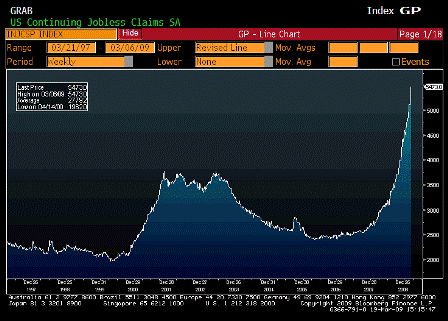
| Survey | 5323K |
| Actual | 5473K |
| Prior | 5317K |
| Revised | 5288K |
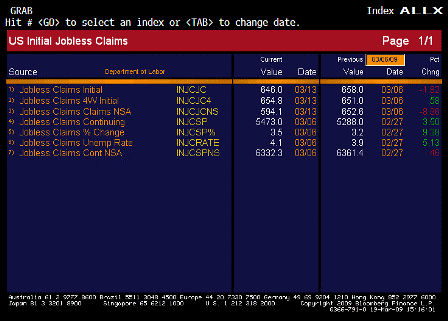
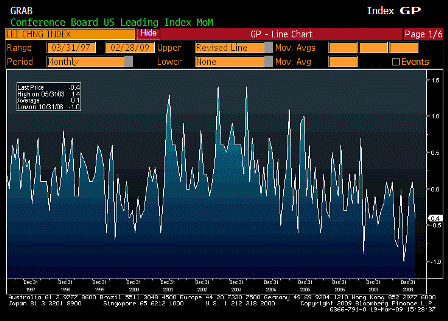
| Survey | -0.6% |
| Actual | -0.4% |
| Prior | 0.4% |
| Revised | 0.1% |
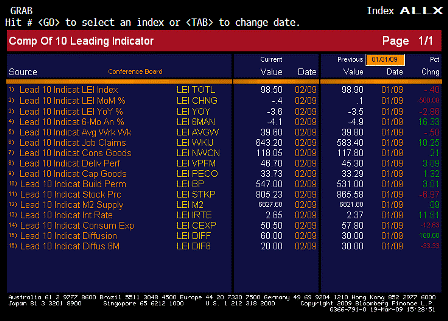

| Survey | -39.0 |
| Actual | -35.0 |
| Prior | -41.3 |
| Revised | n/a |
Karim writes:
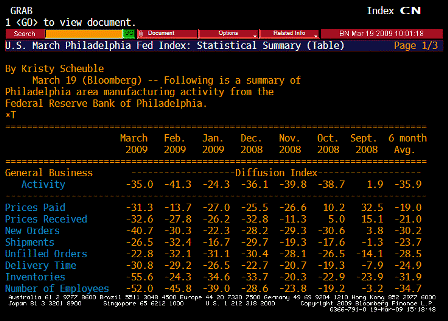
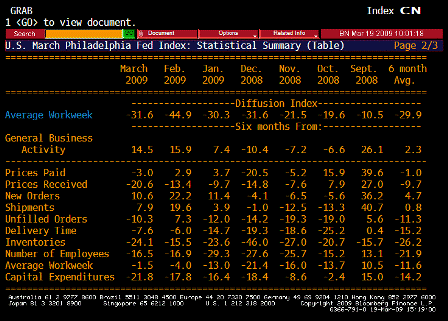
[top]
Problem is those things cut rates, they don’t ‘inject credit’ or alter net financial assets held by the non government sectors.
It’s about price, not quantity.
Fed Wrestles Over How to Inject Credit Into Economy
by Steve Matthews
Mar 18 (Bloomberg) — Fed officials will debate how to provide further stimulus to the economy, from purchasing more mortgage bonds to buying Treasury securities, and will also keep the benchmark interest rate as low as zero percent, according to economist projections. At least three of the 17 top Fed officials want to buy Treasuries or target the supply of money, while Chairman Ben S. Bernanke has favored reviving specific credit markets. Policy makers have disagreed on just how to be more aggressive. They have at least three options: increase the $1 trillion Term Asset-Backed Securities Loan Facility aimed at restoring consumer and business lending; expand purchases of mortgage-backed securities and agency securities; or begin purchasing long-term Treasuries.
[top]
Hi Ron,
Add this?
But let me add that it’s our fault. We make the laws and the regulations. If anyone violates the laws there are prisons waiting for them.
If they acted within our laws, however flawed, it’s our responsibility to alter those laws to serve public purpose as we can best determine.
Therefore, while addressing the current injustices will be pursued with the full force of the law, I will be moving just as forcefully to alter existing law to remove the incentives that encouraged this outrageous behavior, and put in additional safe guards, along with appropriate supervision, to ensure public purpose is served by our corporate structures.
All the best!
Warren
Statement of Congressman Ron Klein, as prepared for delivery
Hearing of the Subcommittee on Capital Markets, Insurance, and Government Sponsored Enterprises
“American International Group’s Impact on the Global Economy: Before, During, and After Federal Intervention” Wednesday, March 18, 2009
Thank you, Chairman Kanjorski, for holding this important hearing.
I am disgusted by the deplorable saga of AIG, and I join my constituents in their unfettered outrage about the millions of dollars in bonuses that are being awarded to AIG employees.
The American people understand that we are going through a difficult time, and are prepared to sacrifice and work together to get our country back on track. But they will not stand for taxpayer dollars being lavished on bonuses for people who bear responsibility for this crisis, and neither will I.
When I am back in my district in South Florida, I talk to people who have lost their jobs. Who have closed the doors to their small business because they can’t get a loan on reasonable terms. Who have lost their health care, or their home, or their pension and retirement savings.
Yet here I am sitting across from the AIG Chairman and CEO who is distributing million dollar bonuses to those who drove company in the ground. There is a tremendous disconnect between South Florida and the executive offices of AIG.
I just want to know one thing. What were you thinking?
I look forward to the testimony, and a frank discussion today.
[top]
Yes, thanks, not bad!
And interesting how they want to substitute taxes that are equally regressive, but that’s another story.
Not Insane
by Hendrik Hertzberg
Mar 18 (The New Yorker) — On Hardball the other night, David Frum was complaining about the Republican Partyâ€â€Âa popular activity at MSNBC, a cable news network whose prime-time hosts are non-Republicans, including Hardball’s Chris Matthews. Frum, however, is a non-non-Republican, and an overdetermined one: 1980 Reagan volunteer, Federalist Society activist, Wall Street Journal editorial-page editor, George W. Bush speechwriter (“axis of evilâ€ÂÂ), National Review contributing editor, American Enterprise Institute resident fellow. What conservatives are saying, he told Matthews, is increasingly not only counterproductive economically but also politically. We look like we don’t care. We look like we’re indifferent. We don’t offer solutions. We’re talking about a spending freeze in the middle of a 1929-30-style meltdown!
On ABC’s This Week, David Brooks, the Times columnist, was even more aghast. Brooksâ€â€Âwhose conservative credentials (William F. Buckley, Jr., protégé, Wall Street Journal op-ed editor, Weekly Standard senior editor) aren’t too shabby, eitherâ€â€Âsaid wonderingly, “There are a lot of Republicans up on Capitol Hill right now who are calling for a spending freeze in the middle of a recession slash depression. That is insane.†Quite a lot of Republicans, actually, and they weren’t just talking about it: On March 6th, John Boehner, the House Republican leader, made a motion on the floor for just such a freeze. His charges voted for it, a hundred and fifty-two to nothing.
The theory that preventing the United States government from spending more money will halt the cascading crisis of demand that threatens the world with recession slash depression is indeed crazy. And many Republicans, even as they rail against “government spending,†at least understand that the government must cause more money to be spent, and that the fiscal deficit must rise in the process. They just want the government to do the job indirectly, by cutting taxesâ€â€Âespecially taxes paid by the well-off, such as inheritance taxes, capital-gains taxes, corporate taxes, and high-bracket income taxesâ€â€Âin the hope that the money left untaxed will be spent. It is useless to point out to them that this approach was tried for eight years and found wanting, that in this economy the comfortable are less likely than the strapped to spend any extra cash that comes their way, that government spending often serves socially useful purposes, that “wasteful spending†is not a government monopoly (see corporate jets, golf-course “conferences,†premium vodkas), and that the only way to insure that money is spent is, precisely, to spend it.
And yet, lurking underneath the anti-spending, pro-tax-cutting cant is one idea that might truly have merit. Frum mentioned it on that Hardball broadcast, touching off this rather cryptic exchange:
FRUM: I’m for a big payroll-tax holiday that would go into effect immediately.
MATTHEWS: I know about the payroll, uhâ€â€Âin other words, it gets money back in the hands of people who are working people, right?
FRUM: Up to a hundred and twenty dollars per week per worker, starting last month.
MATTHEWS: But it sounds like a liberal argument. The funny thing is, the liberals haven’t pushed it. And I don’t know why, because working people pay a very regressive tax when they go to work, right?
Right. The payroll taxâ€â€Âa.k.a. the Social Security tax, the Social Security and Medicare tax, or the Federal Insurance Contributions Act (FICA) tax skims around fifteen per cent from the payroll of every business and the paycheck of every worker, from minimum-wage burger-flippers on up, with no deductions. No exemptions, eitherâ€â€Âexcept that everything above a hundred grand or so a year is untouched, which means that as salaries climb into the stratosphere the tax, as a percentage, shrinks to a speck far below. This is one reason that Warren Buffett’s secretary (as her boss has unproudly noted) pays Uncle Sam a higher share of her income than he does. In fact, three-quarters of American households pay more in payroll tax than in income tax.
Where income taxes are concerned, even Republicans seldom argue that taxing added income over a quarter million dollars at, say, thirty-six per cent rather than thirty-three per cent is wrong because the affluent need more stuff. They argue that making the rich richer enables them to create jobs for the non-rich. More jobs: that’s a big argument for capital-gains and inheritance-tax cuts, too. But the payroll tax is a direct tax on work and workersâ€â€Âon jobs per se. If the power to tax is the power to destroy, then the payroll tax is, well, insane.
Frum is not the only Republican on the case. “If you want a quick answer to the question what would I do,†Mitch McConnell, the Senate Republican leader, said recently, “I’d have a payroll-tax holiday for a year or two. That would put taxes in the hands of everybody who has a job, whether they pay income taxes or not.†Other Republican politicians and conservative publicists have made similar noises. They haven’t made it a rallying point, though; it would, after all, shape the over-all tax system in a progressive direction. Anyhow, their sincerity may be doubted: when President Obama proposed a much more modest cut along similar linesâ€â€Âa refundable payroll-tax credit of four hundred dollarsâ€â€Âthey denounced it as a welfare giveaway.
Liberals have been reticent, too. The payroll tax now provides a third of federal revenues. And, because it nominally funds Social Security and Medicare, some liberals regard its continuance as essential to the survival of those programs. That’s almost certainly wrong. Public pensions and medical care for the aged have become fixed, integral parts of American life. Their political support no longer depends on analogizing them to private insurance. Besides, the aging of the population, the collapse of defined-benefit private pensions, the volatility of 401(k)s, and pricey advances in medical technology mean that, no matter what efficiencies may be achieved, Social Security and Medicare willâ€â€Âand shouldâ€â€Âgrow. Holding them hostage to ever-rising, job-killing payroll taxes is perverse.
If the economic crisis necessitates a second stimulusâ€â€Âand it probably willâ€â€Âthen a payroll-tax holiday deserves a look. But it’s only half a good idea. A whole good idea would be to make a payroll-tax holiday the first step in an orderly transition to scrapping the payroll tax altogether and replacing the lost revenue with a package of levies on things that, unlike jobs, we want less rather than more ofâ€â€Âthings like pollution, carbon emissions, oil imports, inefficient use of energy and natural resources, and excessive consumption. The net tax burden on the economy would be unchanged, but the shift in relative price signals would nudge investment from resource-intensive enterprises toward labor-intensive ones. This wouldn’t be just a tax adjustment. It would be an environmental program, an anti-global-warming program, a youth-employment (and anti-crime) program, and an energy program.
Impossible? A politically heterogeneous little group with the unfortunately punctuated name of Get America Working! has been quietly pushing this combination for twenty years. In one form or another, without much fanfare, it has earned the backing of such diverse characters as Al Gore and T. Boone Pickens, the liberal economist James Galbraith and the conservative economist Irwin Stelzer, Republican heavies like C. Boyden Gray and Democratic heavies like Robert Reich. It’s ambitious, it jumbles ideological and partisan preconceptions, and it represents the kind of change that great crises open political space for. Does that sound like anyone you know?
[top]